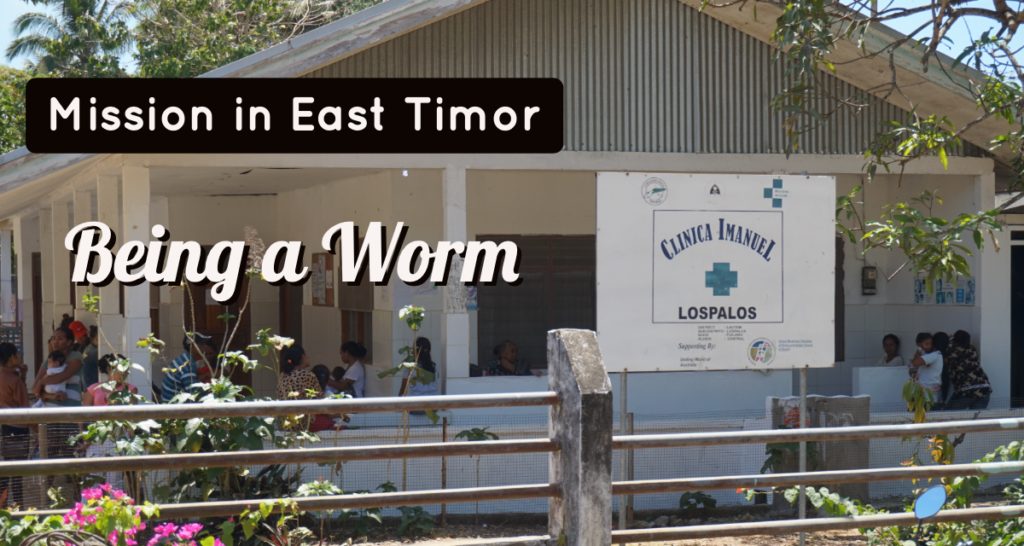Being a Worm
“…I am a worm and not human; scorned by others and despised by the people.”
Psalm 22:6
About 10 o’clock one night, Linda showed up at our door in need of medical care. She had cuts and bruises on the backs of her forearms, evidence of having to defend herself against people attacking her with something hard and sharp. She was in tears, speaking incoherently and upset. Monica treated the wounds, we gave her something to eat, and sat with her for a few minutes before, all of a sudden, she got up and left.
A few weeks prior on a Sunday morning, Linda charged onto the church compound agitated about something. She grabbed a wheelbarrow, drug it out into the street, turned it upside down and covered it with flowers. “Hmm…this is interesting,” I thought as I stood watching… “What should I do?” With Sunday worship about to start, I turned and walked away hoping Linda would disappear. She came back, this time hurling several large rocks through the windows of the house next to the clinic where three youth live.
This week, Linda appeared one day after the clinic was closed and wanted to consult with Monica. Our theory about Linda is that the main reason she comes to Clinic Immanuel is for compassionate human interaction. With that in mind, Monica did what she always does with her: asked about her symptoms, weighed her and listened with the stethoscope, took her blood pressure, and finally gave her some vitamins and Tylenol. Linda was more than satisfied. I had just cooked dinner so we offered her some food. We sat down with her as she ate and listened to her tell stories which were hard to understand in her confusing mix of Tetun, Indonesian and Fataluku.
Linda is one of a handful of wanderers in Lospalos. She has some kind of mental illness and certainly a history of trauma. A friend of mine told me that in the late 90s she witnessed Indonesian troops shoot her husband and children, and thereafter went crazy. I don’t know if it’s true, but it could be. Timor-Leste has a lot of stories like that.
Homelessness is relatively rare here. Extended families living together is normal, so most everyone has a place to call home. Most wanderers have an undiagnosed and untreated mental illness. Sadly, there are absolutely no services for them. But what is more tragic is how little sympathy most people have for them. They are categorized as “bulak,” crazy, and written off as less than human. People fear them and don’t interact with them. Youth either run away scared or harass and sometimes assault them. That’s probably why Linda wields a large kitchen knife as she walks about town.
Dealing compassionately with people like Linda is complex, messy and often uncomfortable but it is an imperative part of Christian spirituality and ministry. After all, the most fundamental insight about humanity in the Bible is that people are made in the image of God. And sometimes the image of God is disfigured, mangled and brutalized; the most shocking example being Jesus’ suffering on the cross.
“My God, my God, why have you forsaken me?” Jesus utters on the cross in Mark’s Gospel. These words are the first verse of Psalm 22. The psalm is a prayer of desperation and faith. When he prays that first verse though, the whole psalm is implied including: “…I am a worm and not human; scorned by others and despised by the people”(v. 6). Surely this is also how the Lindas of the world feel. It’s certainly how they’re treated! And so in the cross of Christ we discover that they’re not alone. Christ himself was a “…worm and not human….” in brotherhood with the Lindas of the world. And in that singular act of self-giving love he affirmed something we must re-learn everyday: “God does not despise or abhor the affliction of the afflicted. He does not hide his face from them, but hears when they call” (24).
Tom and Monica Liddle serve with the Protestant Church of East Timor (IPTL). Mission Co-worker appointments are made possible by your gifts to Disciples Mission Fund, Our Church’s Wider Mission, and your special gifts.

